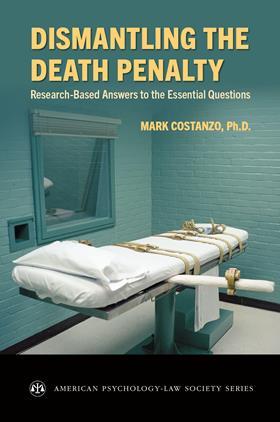Dismantling the Death Penalty: Research-Based Answers to the Essential Questions
Mark Costanzo
£22.99 Oxford University Press
★★★★★
Two recent incidents in the UK have provided stark contrasts in relation to the death penalty debate. The first was the news that Southport killer Axel Rudakubana – currently serving a minimum of 52 years in jail for the murder of three young girls and the attempted murder of 10 other people at a dance class last summer – allegedly hurled boiling water over a prison officer. This led to calls for the death penalty to be restored in Britain, an idea that the prime minister swiftly slapped down. Then, Peter Sullivan (pictured), who had spent 38 years in prison for the murder of Diane Sindall in 1986, was released after DNA evidence proved his innocence. Sullivan’s imprisonment has been called the biggest miscarriage of justice in the nation’s history. However, had the death penalty not been abolished 23 years earlier, it is likely he would not have been alive to walk out of prison on 13 May 2025.

The US remains the only country in the western world that executes its citizens. In an incredibly well-researched, comprehensive, and engaging book, Mark Costanzo, professor of psychological science at Claremont McKenna College and co-director of the Centre for Applied Psychological Research, answers most of the questions that surround an issue almost as polarising as the debates around abortion, gun control and immigration.
Costanzo’s book is only 156 pages. Still, it succinctly covers all the significant issues, such as whether killing murderers is morally justified, whether the death penalty deters violent crime (it doesn’t), and, of course, the problem of errors and biases.

Dismantling the Death Penalty does not shy away from detailing the process of executing a person and the effect this has on the person carrying out the killing. He cites a letter to the governor of Arkansas written by 23 former correction officers. It stated:
‘[T]here is absolutely no way to conduct a well-run execution without causing at least one person to lose a bit of their humanity, or to start at least one person on the cumulative path to post-traumatic stress’.
Costanzo argues that two groups of people benefit from the death penalty remaining in place: the public and politicians. For the public, he states that although the death penalty provides a chance to vent anger, frustration and revenge against violent criminals, any benefits are largely illusory and symbolic. Politicians get a more tangible and immediate benefit by being able to demonstrate they are ‘tough on crime’. However, it is getting harder to argue the positives of keeping capital punishment when rates of violent crime in the US, although declining, remain far higher than in other advanced democracies.
The most compelling argument I ever heard regarding the death penalty was during my time in law school. Someone said in a lecture: ‘How can the state tell us not to kill but then have the right to take our lives?’
No one I know has ever been able to counter this assertion.
Corinne McKenna is a legal copywriter































1 Reader's comment